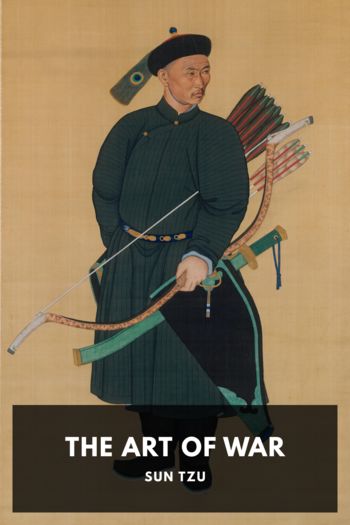The Art of War, Sun Tzu [best english books to read for beginners TXT] 📗

- Author: Sun Tzu
Book online «The Art of War, Sun Tzu [best english books to read for beginners TXT] 📗». Author Sun Tzu
I have found it difficult to glean much about the history of Sun Tzǔ’s text. The quotations that occur in early authors go to show that the “13 chapters” of which Ssǔ-ma Chʽien speaks were essentially the same as those now extant. We have his word for it that they were widely circulated in his day, and can only regret that he refrained from discussing them on that account.80 Sun Hsing-yen says in his preface:—
During the Chʽin and Han dynasties Sun Tzǔ’s Art of War was in general use amongst military commanders, but they seem to have treated it as a work of mysterious import, and were unwilling to expound it for the benefit of posterity. Thus it came about that Wei Wu was the first to write a commentary on it.81
As we have already seen, there is no reasonable ground to suppose that Tsʽao Kung tampered with the text. But the text itself is often so obscure, and the number of editions which appeared from that time onward so great, especially during the Tʽang and Sung dynasties, that it would be surprising if numerous corruptions had not managed to creep in. Towards the middle of the Sung period, by which time all the chief commentaries on Sun Tzǔ were in existence, a certain 吉天保 Chi Tʽien-pao published a work in 15 chüan entitled 十家孫子會注 Sun Tzǔ with the collected commentaries of ten writers.82 There was another text, with variant readings put forward by Chu Fu of 大興 Ta-hsing,83 which also had supporters among the scholars of that period; but in the Ming editions, Sun Hsing-yen tells us, these readings were for some reason or other no longer put into circulation.84 Thus, until the end of the 18th century, the text in sole possession of the field was one derived from Chi Tʽien-pao’s edition, although no actual copy of that important work was known to have survived. That, therefore, is the text of Sun Tzǔ which appears in the War section of the great Imperial encyclopedia printed in 1726, the 古今圖書集成 Ku Chin Tʽu Shu Chi Chʽêng. Another copy at my disposal of what is practically the same text, with slight variations, is that contained in the 周秦十一子 Eleven philosophers of the Chou and Chʽin dynasties (1758). And the Chinese printed in Capt. Calthrop’s first edition is evidently a similar version which has filtered through Japanese channels. So things remained until 孫星衍 Sun Hsing-yen (1752–1818), a distinguished antiquarian and classical scholar,85 who claimed to be an actual descendant of Sun Wu,86 accidentally discovered a copy of Chi Tʽien-pao’s long-lost work, when on a visit to the library of the 華陰 Hua-yin temple.87 Appended to it was the 遺說 I Shuo of 鄭友賢Chêng Yu-hsien, mentioned in the Tʽung Chih, and also believed to have perished.88 This is what Sun Hsing-yen designates as the 古本 or 原本 “original edition (or text)”—a rather misleading name, for it cannot by any means claim to set before us the text of Sun Tzǔ in its pristine purity. Chi Tʽien-pao was a careless compiler,89 and appears to have been content to reproduce the somewhat debased version current in his day, without troubling to collate it with the earliest editions then available. Fortunately, two versions of Sun Tzǔ, even older than the newly discovered work, were still extant, one buried in the Tʽung Tien, Tu Yu’s great treatise on the Constitution, the other similarly enshrined in the Tʽai Pʽing Yü Lan encyclopedia. In both the complete text is to be found, though split up into fragments, intermixed with other matter, and scattered piecemeal over a number of different sections. Considering that the Yü Lan takes us back to the year 983, and the Tʽung Tien about 200 years further still, to the middle of the Tʽang dynasty, the value of these early transcripts of Sun Tzǔ can hardly be overestimated. Yet the idea of utilizing them does not seem to have occurred to anyone until Sun Hsing-yen, acting under Government instructions, undertook a thorough recension of the text. This is his own account:—
Because of the numerous mistakes in the text of Sun Tzǔ which his editors had handed down, the Government ordered that the ancient edition [of Chi Tʽien-pao] should be used, and that the text should be revised and corrected throughout. It happened that Wu Nien-hu, the Governor Pi Kua, and Hsi, a graduate of the second degree, had all devoted themselves to this study, probably surpassing me therein. Accordingly, I have had the whole work cut on blocks as a textbook for military men.90
The three individuals here referred to had evidently been occupied on the text of Sun Tzǔ prior to Sun Hsing-yen’s commission, but we are left in doubt as to the work they really accomplished. At any





Comments (0)